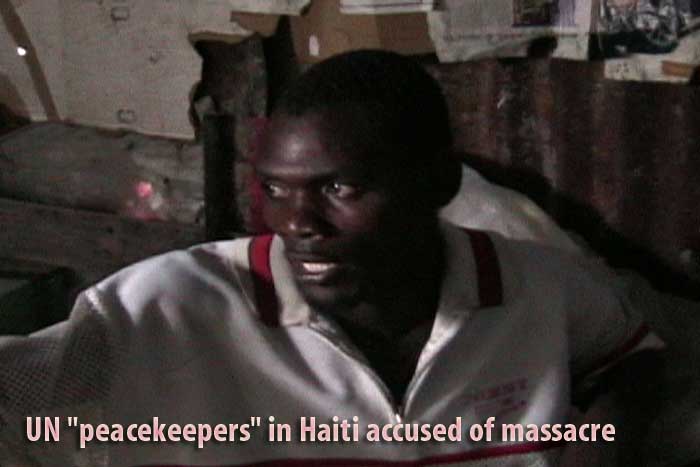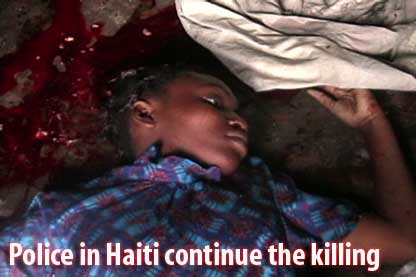|
Evidence mounts of a UN massacre in Haiti
July 12, 2005
|
News
HaitiAction.net
|
||||
 |
 |
 |
 |
 |
 |
 |
| Photos: ©2005 Haiti Information Project - On July 6 in Cite Soleil, a weeping Fredi Romelus, recounted how UN troops lobbed a red smoke grenade into his house and then opened fire killing his wife and two children. "They surrounded our house this morning and I ran thinking my wife and the children were behind me. They couldn't get out and the blan [UN] fired into the house." |
 |
| Cite Soleil residents grieve after discovering family members killed by UN forces on July 6, 2005. More than 350 UN soldiers executed a military assault on the seaside shantytown ostensibly in search of gang leaders ahead of Haiti's troubled elections scheduled to begin in early October. Raids such as this are the UN's answer to stemming violence in the Caribbean nation. |
 |
| Lying in blood on the floor of the modest home were Mr. Romelus's wife, 22 year-old Sonia Romelus who was killed by the same bullet that passed through the body of her 1 year-old infant son Nelson. |
 |
| Jean Jorel, a Lavalas representative and member of the Fanmi Lavalas Political Commission commented, "Today all the popular neighborhoods are under attack." |
 |
| At least 3 people were killed and scores injured after U.N. and PNH security forces reportedly entered the area with "guns shooting everywhere" according to residents. This was followed by a four-day siege of the pro-Aristide neighborhood of Bel Air that began on June 2. At least 30 people were killed and more than 15 homes were reportedly burned to the ground. |
 |
| The Haitian police moved against Bel Air again on June 17 killing at least 10 people in another bloody raid. Among the first victims shot by the police that day was 17 year-old Natalie Luzius. She was clutching her 6 month-old son Fritznel Luzius to protect him at the moment a police bullet struck her in the head and killed her. Click image to read story of June 17, 2005 |
| View photo gallery of all 12 images WARNING: Extremely graphic images. Will be disturbing to most. |
Evidence mounts of a UN massacre in Haiti
View photo gallery of all 12 images
WARNING: Extremely graphic images.
Will be disturbing to most.
Port au Prince, Haiti (HIP) - In the early morning hours of July 6, more than 350 UN troops stormed the seaside shantytown of Cite Soleil in a military operation with the stated purpose of halting violence in Haiti. The successful goal of the mission was to assassinate a 31 year-old man and his lieutenants that Haiti's rightwing media and reactionary business community had labeled a bandit and armed of supporter of ousted president Jean-Bertrand Aristide. According to residents, Emmanuel "Dread" Wilmer and four others were felled in a hail of gunfire that came from all directions including a circling helicopter. According to the Associated Press, a military spokesman for the UN peacekeeping mission in Haiti, Colonel Eloufi Boulbars stated, "Armed bandits who had tried to resist were either killed or wounded."
On July 6 in Cite Soleil, a weeping Fredi Romelus, recounted how UN troops lobbed a red smoke grenade into his house and then opened fire killing his wife and two children. "They surrounded our house this morning and I ran thinking my wife and the children were behind me. They couldn't get out and the blan [UN] fired into the house." Exclusive video footage from a HIP reporter captured the interview as well as the images of the three victims. Lying in blood on the floor of the modest home were Mr. Romelus's wife, 22 year-old Sonia Romelus who was killed by the same bullet that passed through the body of her 1 year-old infant son Nelson. She was apparently holding the child as the UN opened fire. Next to them was her four year-old son Stanley Romelus who was killed by a single shot to the head.
Officially, the UN has responded that they only opened fire after being fired upon and have discounted non-combatant casualties. The HIP video shows 31 year-old Leonce Chery moments after a headshot ripped through his jaw. Chery was clearly unarmed as he lay bleeding to death in a pool of his own blood. In fact, the majority of the victims shown on the video were unarmed falling prey to a single shot to the head.
The international medical group Doctors without Borders, reported 26 people from Cite Soleil were treated for gunshot wounds at St. Joseph's hospital following the UN operation on July 6. According to reports, 20 of the injured were women and children and one pregnant woman lost her child during surgery. Many wounded and untreated victims of gunshot wounds are reported to be hiding in Cite Soleil. They fear leaving the area to seek medical treatment for fear of reprisal by the UN and the Haitian police.
In an exclusive interview in Cite Soleil following the UN operation, Jean Jorel, a Lavalas representative and member of the Fanmi Lavalas Political Commission commented, "Today all the popular neighborhoods are under attack." Jorel continued, "These neighborhoods represent the poor and the majority of the Haitian people. Neighborhoods like Cite Soleil, Bel Air and Solino have been turned into cemeteries. Since the coup of Feb. 29, 2004, the international community has never concerned themselves with creating programs for the poor. Instead they have taken up a campaign of extermination against the poor at the request of Reginald Boulos, Charles Henry Baker, and Andy Apaid. We ask the international community to end their hypocrisy. We ask them to stop the killing! We ask them to stop supporting this unelected government and realize that the majority, who are the poor, are committed to the return of Jean-Bertrand Aristide."
The U.S. State Department and Haiti's wealthy elite had called for the UN to take tougher action against supporters of Aristide's political movement known as Lavalas. Dr. Reginald Boulos, the president of the Haitian Chamber of Commerce and Industry, called on the UN to step up its military operations against the "bandits" on May 27. Meanwhile, the term "bandits" has become a code word to signify Lavalas supporters in the Haitian elite-run media.
In response, the U.N. and the Police Nationale d'Haiti (PNH) launched a major offensive against Cite Soleil on May 31. At least 3 people were killed and scores injured after U.N. and PNH security forces reportedly entered the area with "guns shooting everywhere" according to residents. This was followed by a four-day siege of the pro-Aristide neighborhood of Bel Air that began on June 2. At least 30 people were killed and more than 15 homes were reportedly burned to the ground. Human rights observers described the tactics being employed by the Haitian police during the raids as a "scorched earth" policy. The Haitian police moved against Bel Air again on June 17 killing at least 10 people in another bloody raid. Among the first victims shot by the police that day was 17 year-old Natalie Luzius. She was clutching her 6 month-old son Fritznel Luzius to protect him at the moment a police bullet struck her in the head and killed her. UN forces carried out a large military operation in Bel Air on June 29 stating that only combatants were killed. Residents claim the UN shot and killed unarmed bystanders during the course of that operation as well. This apparent strategy of alternating attacks by the Haitian police and UN military forces on pro-Aristide communities continues.
The U.S. State department responded by adding its support to the anti-Lavalas crusade. Roger Noreiga, assistant secretary of state for Western Hemisphere affairs, directly accused Aristide on June 24 of personally fomenting violence in Haiti. Noreiga asserted in a Miami Herald interview, "We believe that his people are receiving instructions directly from his voice and indirectly through his acolytes that communicate with him personally in South Africa."
On July 4, U.S. Ambassador James Foley gave the green light for violently clamping down on Haiti's majority political party, "Today in Haiti they are burning houses, they are burning stores, they are attacking means of transportation and communication links. They are kidnapping people of all social classes. They are assassinating, torturing and raping. All of this has a name: The use of violence against civilians for political purposes is the very definition of terrorism."
Haiti's latest wave of violence and insecurity began after the Haitian police fired on peaceful marches in the capital demanding the return of President Jean-Bertrand Aristide on Feb. 28 and April 27. At least 11 unarmed demonstrators were killed in the two attacks prompting U.N. Secretary General Kofi Annan to echo demands by human rights organizations for an official investigation.
The U.S.-installed government of Gerard Latortue has dismissed allegations against the police despite statements made by Brazilian General Heleno Ribera and video footage taken by a local television station confirming the unprovoked attacks. The video footage also shows members of Haiti's police force planting guns on corpses to justify the slayings on April 27.
Since then, there have been almost daily kidnappings and killings that U.S. Ambassador James B. Foley and the local Haitian business elite blame on a small and violent minority claiming allegiance to Aristide.
The fact that eight Haitian police officers have been implicated and arrested in the recent spate of kidnappings has not softened the rhetoric of the U.S. and Haiti's wealthy elite who continue to call for retribution and violence against pro-Aristide neighborhoods.
See Also
UN in Haiti accused of second massacre
Horrifying evidence surfaces contradicting UN denials July 21, 2007
 |